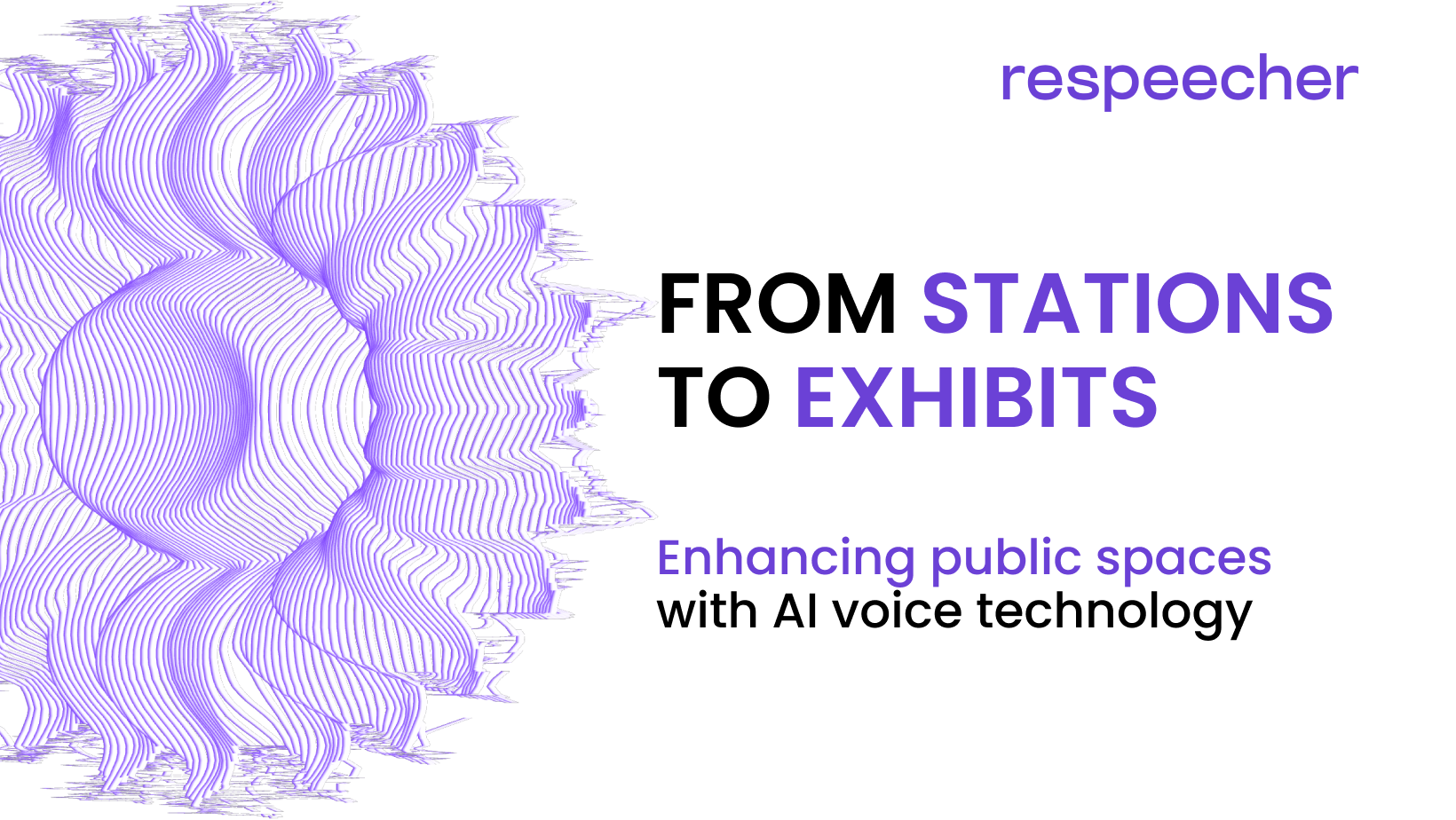From Stations to Exhibits: Enhancing Public Spaces with AI Voice Technology
May 2, 2024 6:21:10 AM

From bustling airports and train stations to serene museums and galleries, efficient information dissemination is vital in ensuring a smooth and enriching experience for visitors. When diverse crowds converge, and mobility is constant, traditional methods of communication often fall short. AI voice technology offers a dynamic and interactive approach to communication, seamlessly integrating with existing infrastructure to provide real-time updates, personalized recommendations, and intuitive guidance.
Overview of AI Voice Technology
At the heart of AI voice technology lies a sophisticated blend of artificial intelligence, natural language processing, and advanced algorithms designed to mimic the nuances of human speech. This transformative technology encompasses both text-to-speech (TTS) and speech-to-speech (STS) applications, revolutionizing the way information is synthesized and communicated in various contexts.
Text-to-speech technology converts written text into spoken words with exceptional clarity and naturalness that rivals human speech. Through the meticulous analysis of linguistic patterns, intonation, and pronunciation rules, AI algorithms produce audio output that is remarkably close to human speech.
Speech-to-speech technology, on the other hand,allows one voice to be converted into another while preserving the tone and delivery of the original voice. By leveraging sophisticated speech recognition and translation algorithms, STS systems enable easy scaling of a voice, creating large amounts of recordings without needing the actor in the studio the entire time. Voice AI in public transit also provides easier post-production and editing, creating more audio material after the recording is finished without having the actor return to the studio. In such a case, getting the actor's permission and paying compensation is necessary.
AI voice technology ensures consistent and articulate communication, free from the variations and limitations inherent in human speech. By delivering information with precision and clarity, TTS systems enhance comprehension and reduce ambiguity, thereby improving the overall quality of interaction. Also, one of the most significant advantages of AI voice technology is its ability to offer multilingual support, transcend linguistic boundaries, and cater to diverse audiences. Finally, by providing alternative modes of communication, AI voice technology promotes accessibility and inclusivity for individuals with disabilities in cases like AI voiceovers in transportation.
Implementing AI Voices in Public Announcements
Implementing generative AI for public announcements in transit systems and various other public spaces represents a significant leap forward in communication efficiency and effectiveness.
AI voice technology uses text-to-speech (TTS) to convert written announcements into natural-sounding speech, ensuring clear and consistent delivery of critical information to passengers. From boarding announcements and schedule updates to safety instructions and emergency alerts, AI-driven smart public systems provide real-time communication that is both informative and reliable.
Another key advantage of voice AI personalization is its ability to offer multilingual support and accessibility features, catering to the diverse needs of passengers from different linguistic backgrounds and abilities. TTS systems can generate announcements in multiple languages, enabling transit authorities to reach a broader audience and enhance the experience for international travelers and multicultural communities.
AI-Powered Information Kiosks
In museums, parks, and tourist spots, AI-powered information kiosks can provide engaging and personalized information. These interactive kiosks leverage the capabilities of AI voice technology to deliver dynamic content, facilitate interactive experiences, and enrich the overall visitor experience with touchless interaction.
AI-powered information kiosks offer visitors a highly engaging and personalized experience by delivering tailored information based on their preferences, interests, and location. These kiosks can interpret user queries and provide relevant recommendations, insights, and multimedia content, creating cutting-edge museum AI guides and other materials.
Also, AI-powered voice-activated kiosks can improve accessibility for individuals with disabilities. By incorporating features such as voice navigation, audio descriptions, and text-to-speech capabilities, these kiosks enable visitors with visual or hearing impairments to access information independently and engage with exhibits, landmarks, and attractions on their own terms. These kiosks can communicate with visitors in their preferred language, providing information and assistance seamlessly and naturally.
Finally, AI-powered information kiosks create interactive experiences that captivate and engage visitors, fostering deeper connections with the content and context of their environment. Through interactive maps, virtual tours, augmented reality overlays, and immersive storytelling, these kiosks transform passive observation into active exploration, encouraging visitors to interact with exhibits, landmarks, and points of interest in innovative and meaningful ways.
Benefits of AI Voice Technology in Public Spaces
AI voice technology enables public spaces to deliver personalized and context-aware announcements that enhance the visitor experience. By analyzing user data and contextual cues, AI systems can tailor announcements to individual preferences, interests, and behaviors, ensuring visitors receive relevant and timely information that enriches their experience.
Also, AI voices play a crucial role in enhancing accessibility in public spaces for individuals with visual impairments and non-native speakers. Through features such as text-to-speech (TTS) and speech-to-text (STT), AI systems enable visually impaired users to access information independently, navigate public spaces with ease, and engage with digital content in a non-visual manner.
Respeecher's advanced AI voice cloning technology further enhances AI in public service applications by generating highly realistic and natural-sounding voices. By analyzing audio recordings and extracting vocal characteristics, Respeecher's algorithms can replicate the nuances of human speech with remarkable accuracy, producing voices that are indistinguishable from those of actual speakers. This level of realism and authenticity enhances the credibility and effectiveness of public announcements AI, ensuring that visitors receive information in a clear, engaging, and trustworthy manner.
One key benefit of Respeecher's technology is its ability to create multilingual voice outputs that maintain consistent quality and authenticity across various languages. By adapting vocal characteristics to the linguistic nuances of different languages, Respeecher ensures that AI voices sound natural and fluent in diverse linguistic contexts, regardless of the speaker's native language or accent. This consistency in voice quality and authenticity is essential for cosmopolitan areas with diverse populations, where multilingual announcements are paramount to serving the needs of residents and visitors worldwide.
Cultural Sensitivity and Localization
In the globalized world, respecting cultural nuances and meeting local needs is crucial in delivering an exceptional user experience. AI voice technology plays a vital role in this endeavor by offering the flexibility to adapt to different cultural contexts, enhancing user engagement and satisfaction.
Localizing AI voice technology involves more than just translating language; it requires understanding cultural sensitivities, linguistic nuances, and societal norms unique to each region. By localizing AI voices, developers can ensure that the technology resonates with users more deeply, fostering a sense of familiarity, comfort, and trust.
AI voice technology can adapt to different language variations and accents prevalent in specific regions. Also, localized AI voices can incorporate culturally relevant references and idiomatic expressions that resonate with users in a particular area. Finally, AI voice technology can adapt its tone and language register to meet local expectations.
Conclusion
From transit systems and museums to parks and tourist spots, AI voice technology has enhanced communication by delivering precise, personalized, and context-aware announcements that cater to diverse needs and preferences. By offering multilingual support, digital accessibility features, and dynamic content, AI voices have made public spaces more welcoming and accommodating for individuals with disabilities, non-native speakers, and multicultural communities. Respeecher's voice cloning technology offers an exciting opportunity for urban planners and public space managers working on smart city technology to further enhance the auditory experience in public environments. Consider testing the transformative potential of AI voice technology and Respeecher's voice cloning technology today!

Grant Reaber
Head of Research and Co-founder
Grant Reaber is Head of Research and co-founder of Respeecher, an Emmy-awarding voice cloning technology company based in Ukraine. Respeecher makes technology that lets one person speak in the voice of another. For instance, if you are dubbing a movie, one actor can voice two characters, or the same character can be voiced by two actors. Dr Reaber is an acknowledged expert in deep learning, especially generative models of speech. Dr Reaber did his P.hD. at the University of Aberdeen and his Masters degrees at Carnegie Mellon University.



